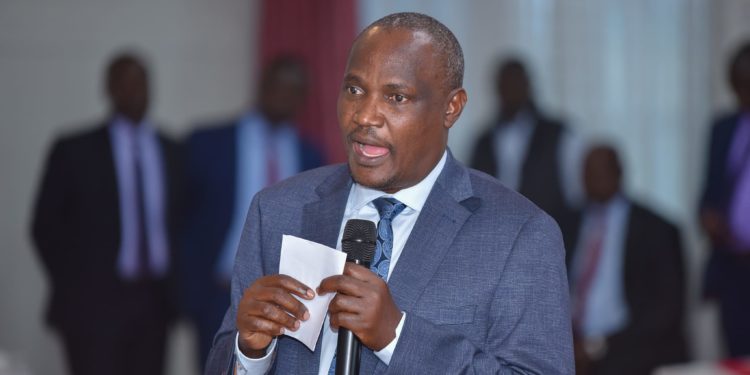Newly appointed Treasury Cabinet Secretary (CS) John Mbadi has pledged to integrate the payroll system across state departments with the Integrated Financial Management Information System (IFMIS).
Speaking at the official handover ceremony from outgoing Treasury CS Njuguna Ndung’u, Mbadi laid out his strategic priorities aimed at addressing the pressing financial challenges facing the country.
In his first address as Treasury CS, Mbadi acknowledged the significant hurdles ahead but stressed the importance of immediate reforms to streamline operations and curb wastage. “If we cannot integrate our payroll system from the state departments to IFMIS, we don’t know what we are doing. Anyone standing in the way of this reform must give way,” Mbadi asserted.
Beyond payroll, Mbadi identified procurement and supply chain management as another area ripe for reform. With Kenya’s public resources under increasing strain, he underscored the need for an efficient and transparent procurement system to prevent abuse and ensure value for money. “Now that resources have become scarce, we must prudently and efficiently use public resources by making the procurement system efficient and not prone to abuse,” he stated.
Mbadi highlighted the ongoing challenges in the procurement sector, noting that past inefficiencies have led to significant financial losses. He pointed to the need for an end-to-end procurement system, aimed at eliminating loopholes that have historically been exploited. “Those who have benefited from the chaotic system have benefited enough. Now, allow Kenyans to get value for money,” Mbadi warned.
At the heart of Mbadi’s reform agenda is a focus on revitalizing revenue collection. He expressed concern over the decline in revenue collection as a percentage of GDP, which has dropped from 22% to below 15% in recent years. “If we could increase our revenue collection to GDP by just 3%, that would give us almost KES 400 billion additional, which could significantly bridge the budget deficit,” Mbadi said.
The CS reiterated the importance of ongoing reforms at the Kenya Revenue Authority (KRA) to reverse this trend. He stressed that boosting revenue is not just about increasing taxes but ensuring that the current system is efficient and effective. The additional revenue, he argued, would be crucial in addressing the budget deficit and moving the country forward economically.
Mbadi also addressed the contentious issue of the Finance Bill 2024, which was recently defeated in Parliament. Acknowledging the challenges this poses, he ruled out any attempts to reintroduce the bill in its previous form, despite its progressive provisions. “It would be wrong and an insult to the people of Kenya if you tell them you’re reintroducing the Finance Bill 2024. We cannot reintroduce the bill despite its progressive provisions,” Mbadi said, making it clear that the government would explore alternative avenues to achieve its fiscal goals.
One of the key issues Mbadi highlighted was the need to reduce tax expenditure, particularly through reforming the current system of zero-rating certain commodities. He proposed moving these items to tax exemptions instead, a move he believes would help reduce tax leakage and prevent the system from being clogged with fictitious tax refund claims. “The total tax expenditure is KES 525 billion, with 65% of that—over KES 300 billion—linked to VAT refunds. Managing this would mean significant funds could be redirected to development,” Mbadi explained.
In addition to these reforms, Mbadi expressed strong support for extending the tax amnesty program, which has already generated substantial revenue for the government. The program, which has brought in approximately KES 43 billion, provides relief to taxpayers by waiving penalties and interest on back taxes, while encouraging them to settle their principal tax liabilities.
“We need to extend that tax amnesty and use it as a way of bringing in more revenue while also giving relief to taxpayers. This approach is beneficial to the economy because it motivates taxpayers to comply,” Mbadi noted.
Mbadi’s speech was not just a presentation of his immediate plans but a broader vision for the future of Kenya’s financial management. He emphasized the importance of public participation in shaping the country’s fiscal policies, noting that the government would engage with professionals, including accountants, economists, and the private sector, to ensure that the proposed reforms are practical and effective.
“We will do extensive public participation because we don’t want to be accused of introducing things that are insensitive without considering the plight and concerns of Kenyans,” Mbadi concluded, setting the tone for a collaborative approach to fiscal management.












